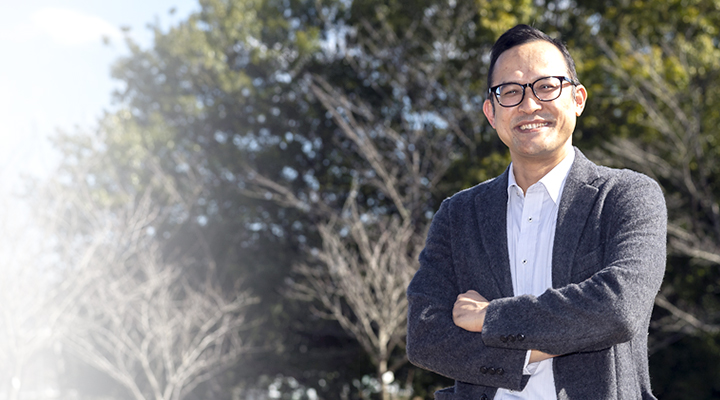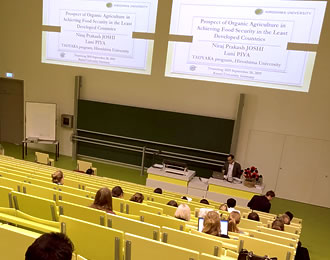
INTERVIEW
Research on rural economies and poverty issues in developing countries
Understanding the hardships residents
in disadvantaged areas face,
and proposing solutions that lead to
an increase in the level of happiness.
Cultural Creation Course
Graduate School of Humanities and Social Sciences
Assoc. Prof.Niraj Prakash JOSHI
Research on rural economies and poverty issues in developing countries
Understanding actual circumstances of agricultural communities in poverty ridden areas and exploring solutions to break the cycle of despair.

Associate Professor Joshi’s expertise focuses on “Rural Economics.” His research is related to poverty, food insecurity, rural life and climate change in developing countries. In particular, he focuses his research on areas gripped by poverty in the hilly region in the Far-western part of Nepal and the Chepang Community of the isolated central hilly regions of Nepal, and conducts research related to production and trade of agricultural products in the North Indian subcontinent.
A vast majority of agricultural village communities in developing countries fall into a vicious cycle of poverty trapped in a life of subsistence farming and are often left behind incapable of feeding their families. However, the Associate Professor concentrates his research efforts on their future happiness by targeting his research on the whole of rural life.

“Agriculture is an important sector in the global initiative to break the vicious cycle of poverty and make contributions to the ‘2030 Agenda for Sustainable Development’ and each initiative includes participation from rural communities.”
The Associate Professor instructs graduate students on Agriculture Production Economics, Special Studies, On-site Education related subjects, Developing Designing Ability, and International Cooperation, In addition, he also participates in the e-START+ Program course for undergraduates at Hiroshima University. In this course, graduate students of Miranda House College for Women in University of Delhi in India and Institute Agriculture and Animal Science, Tribhuvan University in Nepal identify important issues for development to carry out joint research that leads to proposal-based practical solutions.
“The research is based on field studies. The data obtained through field studies, in rural areas and interactions with communities is useful in understanding issues with a deep perspective and offer important insights that complement knowledge obtained from quantitative analysis.”

On-site education offers a thorough format for directly touching problems.
The Associate Professor is mainly in charge of on-site training subjects in the Taoyaka Program. He is engaged in planning and implementation of on-site studies in a joint program with the University of Texas at Austin in the U.S.A., Birla Institute of Technology and Science, Pilani in India, and Tribhuvan University in Nepal. In addition, he provides students with advice on development and implementation of research projects for the on-site team project.

Research case studies the Associate Professor has been involved in so far include the following.
(1) Regional activation of Kitahiroshima Town in Hiroshima Prefecture. Students visited the cultural event “Rice Planting Festival” (Hanata-ue) on-site with the aim of understanding a preservation and promotion of the culture through community participation, interacting with related persons for a deeper understanding and proposed new solutions to address problems through group works.
(2) Reconstruction of agricultural villages in Nepal after a severe earthquake. Nepal agricultural communities faced hardships when reconstructing houses after a destructive “severe earthquake” in 2015. The training provided an opportunity to TAOYAKA students to come together with the students from Tribhuvan University and University of Texas at Austin and visit on-site. The students focused on housing reconstruction issues and a vision for the future for rural residents through local exchanges, and then delivered the results to policymakers.

The Associate Professor also places emphasis on an educational stance where students directly touch problems in the Taoyaka Program.
The Associate Professor pointed out that poverty and starvation continue regardless of international cooperation. “Realization of a world without poverty and starvation is our common goal. It is very important to understand the hardships the poverty-stricken areas and communities face in order to propose solutions to those problems.” It is necessary to find out from responses how rural communities in developing countries can increase their level of happiness. In the Program, we work on this from various cultural (participants from different cultural backgrounds (nationalities)) and academic (participants from different educational fields) perspectives.
Something of value obtained from the experience is significant in becoming a global leader

Associate Professor Joshi returned to his country after taking on the role of a Specially Appointed Assistant Professor for one year after he completed PhD from Graduate School for International Development and Cooperation (IDEC) program at Hiroshima University in 2011. However, he returned to Hiroshima University when the Taoyaka Program was started in 2014, and he has continuously supported the Program since that time. For this reason, he feels very attached to the Taoyaka Program.
His assessment of the program is “the Taoyaka Program has been well-operated in view of the development of leaders understanding technology and implementation of technology in society through proper understanding of the culture while maintaining the aspect of challenging educational revolution.”

The Associate Professor considers that students can grow by directly touching problems similar to his own research stance, and emphasizes the meaning of the Program.
“The purpose of the Taoyaka Program is to develop global leaders connecting cultures, technologies and societies and leading development. It is difficult for students in different fields to work together toward a common purpose, however, students can obtain different perspectives and cultivate critical thinking to apply their own knowledge toward broader societal benefits with the Program. Therefore, it is worthwhile to participate in this Program. From now on, leaders who can acquire negotiation skills for peaceful coexistence and can provide solution methods which respect norms and values of the person concerned will be in demand. Students are expected to acquire various abilities by actively working on studies beyond their major fields of study and comfort zones.”
For many to work on-site became impossible in 2020, and all activities were conducted online, however, the Associate Professor also made efforts to conduct interactive relationships under such circumstances.
![]()
Niraj Prakash JOSHI Associate Professor
Graduate School of Humanities and Social Sciences, Division of Humanities and Social Sciences, International Economic Development Program
April 1, 2020 – Associate Professor at Graduate School of Humanities and Social Sciences of Hiroshima University
April 1, 2017 – March 31, 2020 Specially Appointed Associate Professor in the Taoyaka Program of Hiroshima University
March 1, 2014 – March 31, 2017 Specially Appointed Assistant Professor in the Taoyaka Program of Hiroshima University
February 17, 2013 – February 16, 2014 Associate Professor at Nepal Engineering College – Center for Postgraduate Studies, Pokhara University
October 1, 2011 – September 30, 2012 Specially Appointed Assistant Professor at Graduate School of International Cooperation, Hiroshima University





